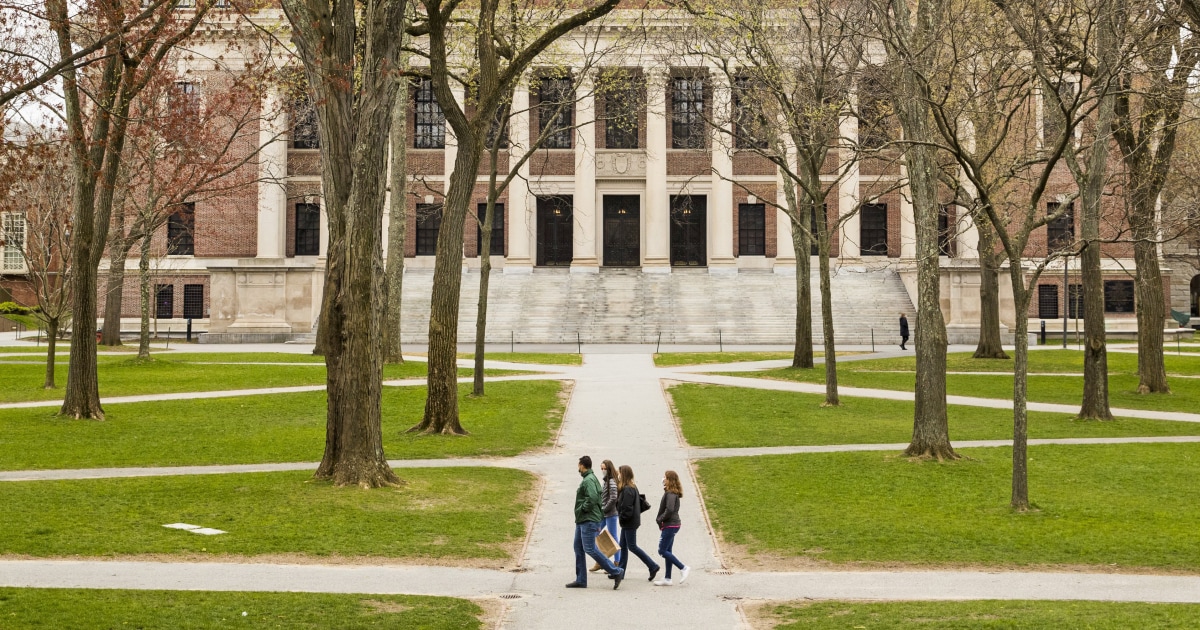
Three graduate students are suing Harvard, alleging the university repeatedly failed to act on sexual harassment by a prominent anthropologist on its faculty.
The lawsuit, filed Tuesday in Massachusetts federal court, centers on John Comaroff, a professor of African and African-American studies and of anthropology whom Harvard placed on unpaid administrative leave last month. He had previously been put on paid leave in August 2020, according to The Harvard Crimson, the student newspaper.
The move came nearly five years after the three grad students in his department — Lilia Kilburn, Margaret Czerwienski and Amulya Mandava — began reporting harassment by him. But even in putting Comaroff on unpaid leave, the university failed to acknowledge Comaroff’s most egregious offenses, the students’ attorneys say.
In an investigation, Harvard concluded that Comaroff “engaged in verbal conduct that violated the FAS [Faculty of Arts and Sciences] Sexual and Gender-Based Harassment Policy and the FAS [Faculty of Arts and Sciences] Professional Conduct Policy,” Faculty of Arts and Sciences Dean Claudine Gay said in an email, according to The Crimson. The findings were from reviews conducted by Harvard’s Office of Dispute Resolution and an external fact-finder.
The university did not find Comaroff responsible for unwanted sexual contact, which is described as “rampant” in the lawsuit filed on behalf of the three women: “He kissed and groped students without their consent, made unwelcome sexual advances, and threatened to sabotage students’ careers if they complained,” it reads.
Comaroff’s attorneys said in a statement that he “categorically denies ever harassing or retaliating against any student.” Harvard, which has not publicly released most of the findings of its investigation, declined to comment on the lawsuit.
Lawyers for the three students claim that Comaroff’s inappropriate behavior toward Kilburn began before she had enrolled at Harvard when she went for a campus visit in 2017 and he kissed her on the mouth. Czerwienski and Mandava, the suit says, reported Comaroff’s pattern of misconduct around other students to the university, only to have him threaten their future job prospects.
All three students said they filed complaints against Comaroff with Harvard’s Title IX officers, who handle sex discrimination complaints, Czerwienski and Mandava in 2017 and Kilburn in 2019. Harvard showed a “deliberate indifference” to the complaints, the lawsuit says, and did not launch an investigation until 2020. The investigation dragged on for more than a year, it added.
A key exchange
Much of the focus stems from an incident on Kilburn’s first day of graduate school, when she met with Comaroff, who had then become her adviser, and expressed to him that she wanted to study in Central Africa.
“During the meeting, Professor Comaroff repeatedly described various ways in which Ms. Kilburn would be raped and killed in South Africa — approximately 3,000 miles away from Central Africa — because she is in a same-sex relationship,” the suit says.
Comaroff’s attorneys acknowledged the conversation he had with Kilburn about fieldwork abroad while traveling with her same-sex partner, but they said going over the risk of sexual violence was a “necessary conversation for her safety.”
His attorneys slammed Harvard’s Title IX investigation for finding the advice constituted sexual harassment when, they said, it came from a place of concern for her well-being.
“Professor Comaroff vehemently disputes this conclusion, which would cripple faculty members’ ability to use their best academic judgment in advising students about essential safety issues,” they said in their statement.
Initially, some faculty members had agreed. The day after Comaroff was placed on unpaid leave, 38 faculty members signed an open letter calling him an “excellent colleague” and expressing dismay at Harvard’s decision, adding that they would feel “ethically compelled to offer the same advice” to a student considering studies in a country with such prohibitions.
But on Tuesday, after the lawsuit provided more information, many said they wanted to remove their signatures, The Boston Globe reported.
The lawsuit accuses Harvard of allowing Comaroff’s behavior toward Kilburn to go unchecked for two years, “subjecting Ms. Kilburn to a continuing nightmare that included more forced kissing, groping, persistent invitations to socialize alone off-campus, and coercive control.” When she tried to avoid him, the suit continues, he forbade her working with any other advisers.
Comaroff denied through his attorneys that he would not allow Kilburn to work with anyone else and said he did not kiss or touch her inappropriately at any time.
When Kilburn filed a complaint in May 2019, the office “took no meaningful action — except to admit that Harvard had known about Professor Comaroff’s behavior for years,” the suit continues.
Carolin Guentert, one of the attorneys for the three graduate students, said the lawsuit aims to show the extent of the alleged abuses by Comaroff, which she said Harvard’s investigation did not do. With regard to Kilburn, focusing only on the verbal sex discrimination, she said, is “really a quite narrow finding.”
“That really ignored the much larger context of kissing and groping and harassment here,” she said.
She said Harvard also placed an undue burden on students to report harassment. The lawsuit claims that the university did not take any initiative in taking disciplinary steps or even in launching its investigation until 2020, when The Harvard Crimson and The Chronicle of Higher Education started reporting on the allegations. Even then, the investigation initially allowed Comaroff to continue teaching “after a slap on the wrist,” according to the suit.
The university also stalled Czerwienski and Mandava, the two other plaintiffs, in their efforts to stop Comaroff, the suit says. In 2017, they had learned of a second-year graduate student whom Comaroff was alleged to be making unwanted sexual advances toward; when they reported it, Comaroff told them they would “have trouble getting jobs” if they continued to make such allegations, the suit says.
They want to make sure that when students come forward with sexual harassment allegations that the schools take them seriously and that they don’t force them through a process that is inordinately burdensome.”
Comaroff’s attorneys say he never threatened students.
Guentert said she hoped the lawsuit would change the reporting processes at colleges and universities.
“This lawsuit highlights just how much power graduate advisers have over graduate students. Some use it for good, but some don’t, and that’s been a problem for years,” she said.
“Our clients are hoping to shine a light on that. They want to make sure that when students come forward with sexual harassment allegations that the schools take them seriously and that they don’t force them through a process that is inordinately burdensome.”
Source: | This article originally belongs to Nbcnews.com










